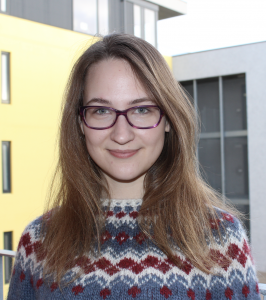Paving the Way for Mrežnik – the First Croatian Web Dictionary
Daria Lazić’s interest in eLexicography led her to get involved in the creation of the first Croatian monolingual web dictionary. ELEXIS supports her undertakings as she familiarizes herself with the existing resources for, and current research discussion about, another language – Danish.
[An Update about Daria Lazić’s research visit is available here.]
How did you learn about the ELEXIS travel grants?
I learned about the ELEXIS travel grants through my work. My institution – the Institute of Croatian Language and Linguistics – takes part in the ELEXIS network as an observer institution.
“The Croatian Web Dictionary Mrežnik will be the first general
Croatian monolingual dictionary,
exclusively compiled as an e-dictionary.”
What is your project about?
I am working on a project called Croatian Web Dictionary – Mrežnik, which is conducted at the Institute of Croatian Language and Linguistics in Zagreb.
Within the project, a new monolingual web dictionary of the Croatian standard language is being compiled. It will be the first Croatian general monolingual dictionary that has been compiled exclusively as an e-dictionary, taking into account the rules of contemporary e-lexicography and the potential of the digital medium.
The digital form will influence the content of dictionary entries and its presentation to users. For example, in order to fulfill the needs of different user groups, the dictionary entries will contain, besides common definitions, diverse pragmatic information such as collocations and examples of use extracted from Croatian text corpora.
Furthermore, while the resource’s main module that will appeal to adult native speakers of Croatian, there will also be modules for pupils and foreigners.
Where does your research visit lead you to?
I applied for a visit to Det Danske Sprog- og Litteraturselskab and the University of Copenhagen for two reasons:
Firstly, since the new Croatian web dictionary will be the first of its kind in Croatia, it is valuable for me to gain an insight into similar dictionaries of other languages. In this regard, Det Danske Sprog- og Litteraturselskab is interesting because of Den Danske Ordbog, a web dictionary of Danish language which is being compiled there.
Secondly, I have recently enrolled in a PhD programme in linguistics and in my thesis, I would like to combine the experience of working on a Croatian web dictionary with my background in Nordic languages. During my stay in Denmark, I want to get acquainted with Danish language resources and to discuss possible research ideas in the field of e-lexicography.
“I want to get acquainted with Danish language resources and discuss possible research ideas in the field of e-lexicography.“
What is your background that brought you up to this point?
I hold a Master’s Degree in Croatian language and Swedish language from the University of Zagreb, as well as a Bachelor’s Degree in Icelandic as a second language from the University of Iceland.
Since May 2018, I have been employed as a research assistant at the Institute of Croatian Language and Linguistics, and a couple of months later I enrolled in a PhD program in linguistics at the University of Zagreb.
My main task as a research assistant is to work on our dictionary project. Since I am relatively new to lexicography, I am constantly delving into broadening my knowledge of lexicographic theory and practice.
“While working on the Croatian dictionary, I constantly have to think about the language and its logic, which is something I have enjoyed ever since.“
Where does your interest in languages/lexicography come from and what keeps you motivated?
As a linguist and a language student, I have long experience with using dictionaries in my studies and research, but the opportunity to work on one appeared only recently, when I joined the Croatian web dictionary project.
While working on the dictionary, I constantly have to think about the language and its logic, which is what I have enjoyed ever since primary school. Moreover, working with modern linguistic resources and tools opens doors for interesting discoveries about language use. For example, one of the sources for our dictionary is the Croatian web corpus, which often contains examples of innovative language use and meanings that I was not aware of. It is this constant process of learning and the awareness that we are creating a useful language resource that keep me motivated.
Find out more about ELEXIS visiting grants and former winning projects:
| Profile: Daria Lazić | ||
| Travel Grant | Call 2 | |
| Period of stay | 17.6.2019 – 5.7.2019 | |
| Project title |
Nordic E-dictionaries in Comparison to |
|
| Home institution |
Institute of Croatian Language and Linguistics (Croatia) |
#elexis_hr |
| Hosting institution |
Det Danske Sprog- og Litteraturselskab |
#elexis_dk |





 © Elina Boeva, 2019
© Elina Boeva, 2019